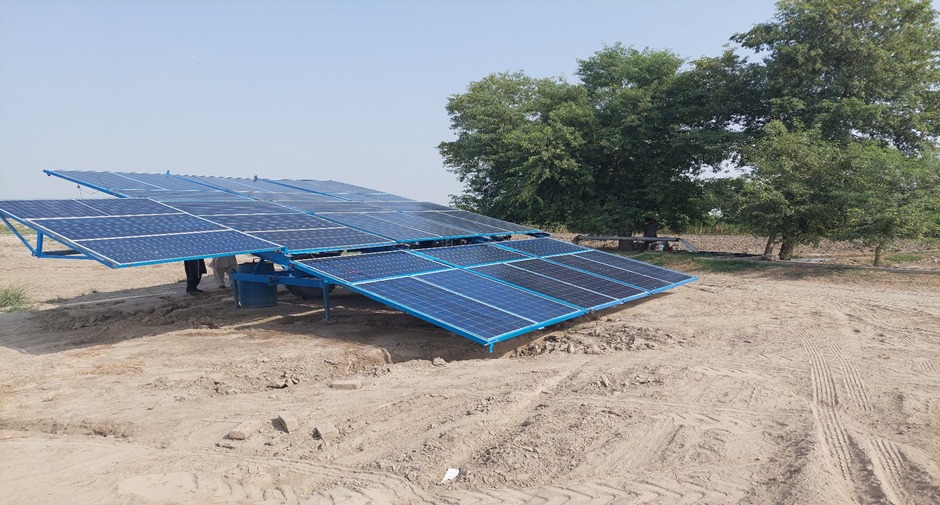ISLAMABAD: The agriculture sector has undergone a revolution thanks to high adoption rate of Portable Solar Pumping System (PSPS) among farmers in the Thal region.
With PSPS, the farmers can use sweet underground water for irrigation –which was previously impossible with diesel-operated pumps due to high per-acre irrigation cost of roughly Rs3,000 per irrigation. The farmers now have zero operating expenses for all irrigations, thanks to PSPS, reports WealthPK.
Khalid Jameel, Scientific Officer at the Pakistan Agricultural Research Council (PARC), told WealthPK that due to the sandy soil texture in Thal, irrigation requires a significant amount of water.
The underground water is pumped through diesel- and electricity-powered tube wells to meet the demand for irrigation water. The farmers in Thal region are typically resource poor and struggle to cover the expenditures of operating and maintaining tube wells.
He said Rs4 to 5 lac is typically spent on diesel annually for irrigation. The PSPS has a hefty installation fee of 8 to 9 lacs, but this is a one-time cost after which there are no further irrigation costs.
Moreover, small farmers who are unable to pay the high initial installation cost of 8 to 9 lac rupees for a PSPS with 30 to 40 solar plates can also lower cost by reducing the number of panels.
Since PSPS eliminates the cost of diesel and electricity for irrigation, the farmers who have adopted it have seen significant increases in their income. The PSPS has a payback time of two to three years and a life of roughly 30,000 years, Khalid added.
He explained that the production of sugarcane per acre improved noticeably from 900 to 1400 maunds per acre, and other crops experienced a similar trend. This is because lower diesel prices enable farmers to invest the money saved from irrigation into agricultural fertiliser. The farmers profit twice as much from increased crop yields; therefore, adoption is increasing in the Thal region.
According to Khalid, farmers in the Thal region report that many people have learned about PSPS through a variety of sources, including other farmers, YouTube videos produced by the NARC, and workshops they used to visit for their trollies’ maintenance. All of the farmers who participated in the poll conducted by the NARC said they had bought from manufacturers more than 1,000 trollies in the Thal region.
The farmers also mentioned that they altered PSPS design to meet their demands. In the Thal region, the PSPS in a variety of designs, including those with hydraulic jacks, slide openings, umbrella openings, and wire openings, have been deployed.
The PSPS adoption is significantly influenced by orientation. This results in an abrupt rise in the demand for PSPS. The farmers order the production of PSPS from local trolley manufacturers. They experimented with different PSPS designs before finally being able to alter the real design to meet the requirements of the nearby farmers.
According to 60% of manufacturers polled, the low cost of water extraction in the Thal area will lead to increased demand for PSPS in future. Additionally, a few manufacturers reported that they had trouble finding technical labour for their production operations. They said some farmers’ attempt to create PSPS in their houses had led to farmer fatalities owing to the poor design. They suggested that the government should authorize a single PSPS design so that it is used by all the manufacturers.
When the farmers in the Thal region encounter PSPS issues, they frequently call electricians, demonstrating their ignorance of the PSPS’s maintenance and operation.
Except the sugarcane season, when all farmers utilise their own trollies to transport the crop, there is a considerable demand for PSPS. The manufacturers will be able to meet the demand for PSPS in the Thal region if the government can assist them.
Due to electricity shortages, the portable solar pumping system might be quite useful for farmers throughout Pakistan.
-INP





